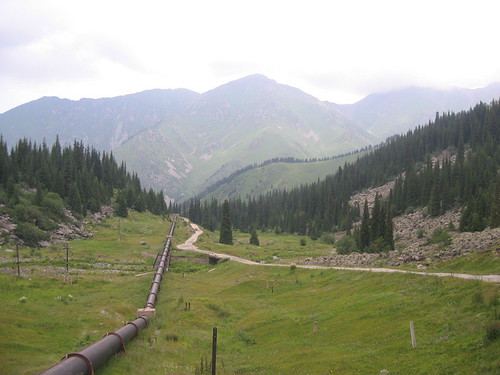A Postcard From Pipelineistan
Posted by Big Gav in btc, pipelineistan, sco
TomDispatch has an update from Pepe Escobar on the goings on in "Pipelineistan", as he terms the central asian regions across which oil and gas transit - Liquid War: Postcard from Pipelineistan. Its worth reading the whole article, not just the snippet.
n his 1997 magnum opus The Grand Chessboard, Zbigniew Brzezinski -- realpolitik practitioner extraordinaire and former national security advisor to Jimmy Carter, the president who launched the U.S. on its modern energy wars -- laid out in some detail just how to hang on to American "global primacy." Later, his master plan would be duly copied by that lethal bunch of Dr. No's congregated at Bill Kristol's Project for a New American Century (PNAC, in case you'd forgotten the acronym since its website and its followers went down).
For Dr. Zbig, who, like me, gets his fix from Eurasia -- from, that is, thinking big -- it all boils down to fostering the emergence of just the right set of "strategically compatible partners" for Washington in places where energy flows are strongest. This, as he so politely put it back then, should be done to shape "a more cooperative trans-Eurasian security system."
By now, Dr. Zbig -- among whose fans is evidently President Barack Obama -- must have noticed that the Eurasian train which was to deliver the energy goods has been slightly derailed. The Asian part of Eurasia, it seems, begs to differ.
Global financial crisis or not, oil and natural gas are the long-term keys to an inexorable transfer of economic power from the West to Asia. Those who control Pipelineistan -- and despite all the dreaming and planning that's gone on there, it's unlikely to be Washington -- will have the upper hand in whatever's to come, and there's not a terrorist in the world, or even a long war, that can change that.
Energy expert Michael Klare has been instrumental in identifying the key vectors in the wild, ongoing global scramble for power over Pipelineistan. These range from the increasing scarcity (and difficulty of reaching) primary energy supplies to "the painfully slow development of energy alternatives." Though you may not have noticed, the first skirmishes in Pipelineistan's Liquid War are already on, and even in the worst of economic times, the risk mounts constantly, given the relentless competition between the West and Asia, be it in the Middle East, in the Caspian theater, or in African oil-rich states like Angola, Nigeria and Sudan.
In these early skirmishes of the twenty-first century, China reacted swiftly indeed. Even before the attacks of 9/11, its leaders were formulating a response to what they saw as the reptilian encroachment of the West on the oil and gas lands of Central Asia, especially in the Caspian Sea region. To be specific, in June 2001, its leaders joined with Russia's to form the Shanghai Cooperation Organization. It's known as the SCO and that's an acronym you should memorize. It's going to be around for a while.
Back then, the SCO's junior members were, tellingly enough, the Stans, the energy-rich former SSRs of the Soviet Union -- Kyrgyzstan, Uzbekistan, Kazakhstan, and Tajikistan -- which the Clinton administration and then the new Bush administration, run by those former energy men, had been eyeing covetously. The organization was to be a multi-layered economic and military regional cooperation society that, as both the Chinese and the Russians saw it, would function as a kind of security blanket around the upper rim of Afghanistan.
Iran is, of course, a crucial energy node of West Asia and that country's leaders, too, would prove no slouches when it came to the New Great Game. It needs at least $200 billion in foreign investment to truly modernize its fabulous oil and gas reserves -- and thus sell much more to the West than U.S.-imposed sanctions now allow. No wonder Iran soon became a target in Washington. No wonder an air assault on that country remains the ultimate wet dream of assorted Likudniks as well as Dick ("Angler") Cheney and his neocon chamberlains and comrades-in-arms. As seen by the elite from Tehran and Delhi to Beijing and Moscow, such a U.S. attack, now likely off the radar screen until at least 2012, would be a war not only against Russia and China, but against the whole project of Asian integration that the SCO is coming to represent.
Meanwhile, as the Obama administration tries to sort out its Iranian, Afghan, and Central Asian policies, Beijing continues to dream of a secure, fast-flowing, energy version of the old Silk Road, extending from the Caspian Basin (the energy-rich Stans plus Iran and Russia) to Xinjiang Province, its Far West.
The SCO has expanded its aims and scope since 2001. Today, Iran, India, and Pakistan enjoy "observer status" in an organization that increasingly aims to control and protect not just regional energy supplies, but Pipelineistan in every direction. This is, of course, the role the Washington ruling elite would like NATO to play across Eurasia. Given that Russia and China expect the SCO to play a similar role across Asia, clashes of various sorts are inevitable.
Ask any relevant expert at the Chinese Academy of Social Sciences in Beijing and he will tell you that the SCO should be understood as a historically unique alliance of five non-Western civilizations -- Russian, Chinese, Muslim, Hindu, and Buddhist -- and, because of that, capable of evolving into the basis for a collective security system in Eurasia. That's a thought sure to discomfort classic inside-the-Beltway global strategists like Dr. Zbig and President George H. W. Bush's national security advisor Brent Scowcroft.






